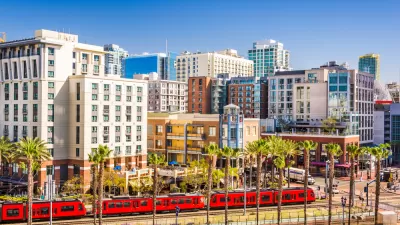The new plan, set to take effect in 2025, accounts for changes in mobility patterns brought on by remote work.

The San Diego Association of Governments (SANDAG) is developing a new long-term transportation plan that will account for the rise in remote work and changes in local commuting and travel patterns, reports Andrew Keatts in Axios.
“Antoinette Meier, SANDAG's senior director of regional planning, said SANDAG's planning decisions always assumed remote work decreased driving, so accounted for greenhouse gas emissions reductions mandated by state law.” However, people are making other vehicle trips that would have previously been wrapped into commutes, leading to a smaller reduction in vehicle miles driven and emissions than previously estimated.
Meanwhile, “San Diego Councilmember Vivian Moreno said the fact that higher-income people living in the northern part of the county are more likely to be allowed to work remotely needs to be factored into the agency's transportation decisions.” As the article notes, “56% of households with annual incomes above $150,000 remote work, more than twice the rate of households with incomes below $49,000.” Moreno called on SANDAG to plan for expanded transit and transportation projects in the southern part of the county, where residents are more likely to continue having to commute to physical workplaces.
FULL STORY: Remote work helps draw blueprint for region's transportation system

Planetizen Federal Action Tracker
A weekly monitor of how Trump’s orders and actions are impacting planners and planning in America.

San Francisco's School District Spent $105M To Build Affordable Housing for Teachers — And That's Just the Beginning
SFUSD joins a growing list of school districts using their land holdings to address housing affordability challenges faced by their own employees.

The Tiny, Adorable $7,000 Car Turning Japan Onto EVs
The single seat Mibot charges from a regular plug as quickly as an iPad, and is about half the price of an average EV.

Seattle's Plan for Adopting Driverless Cars
Equity, safety, accessibility and affordability are front of mind as the city prepares for robotaxis and other autonomous vehicles.

As Trump Phases Out FEMA, Is It Time to Flee the Floodplains?
With less federal funding available for disaster relief efforts, the need to relocate at-risk communities is more urgent than ever.

With Protected Lanes, 460% More People Commute by Bike
For those needing more ammo, more data proving what we already knew is here.
Urban Design for Planners 1: Software Tools
This six-course series explores essential urban design concepts using open source software and equips planners with the tools they need to participate fully in the urban design process.
Planning for Universal Design
Learn the tools for implementing Universal Design in planning regulations.
Smith Gee Studio
City of Charlotte
City of Camden Redevelopment Agency
City of Astoria
Transportation Research & Education Center (TREC) at Portland State University
US High Speed Rail Association
City of Camden Redevelopment Agency
Municipality of Princeton (NJ)





























